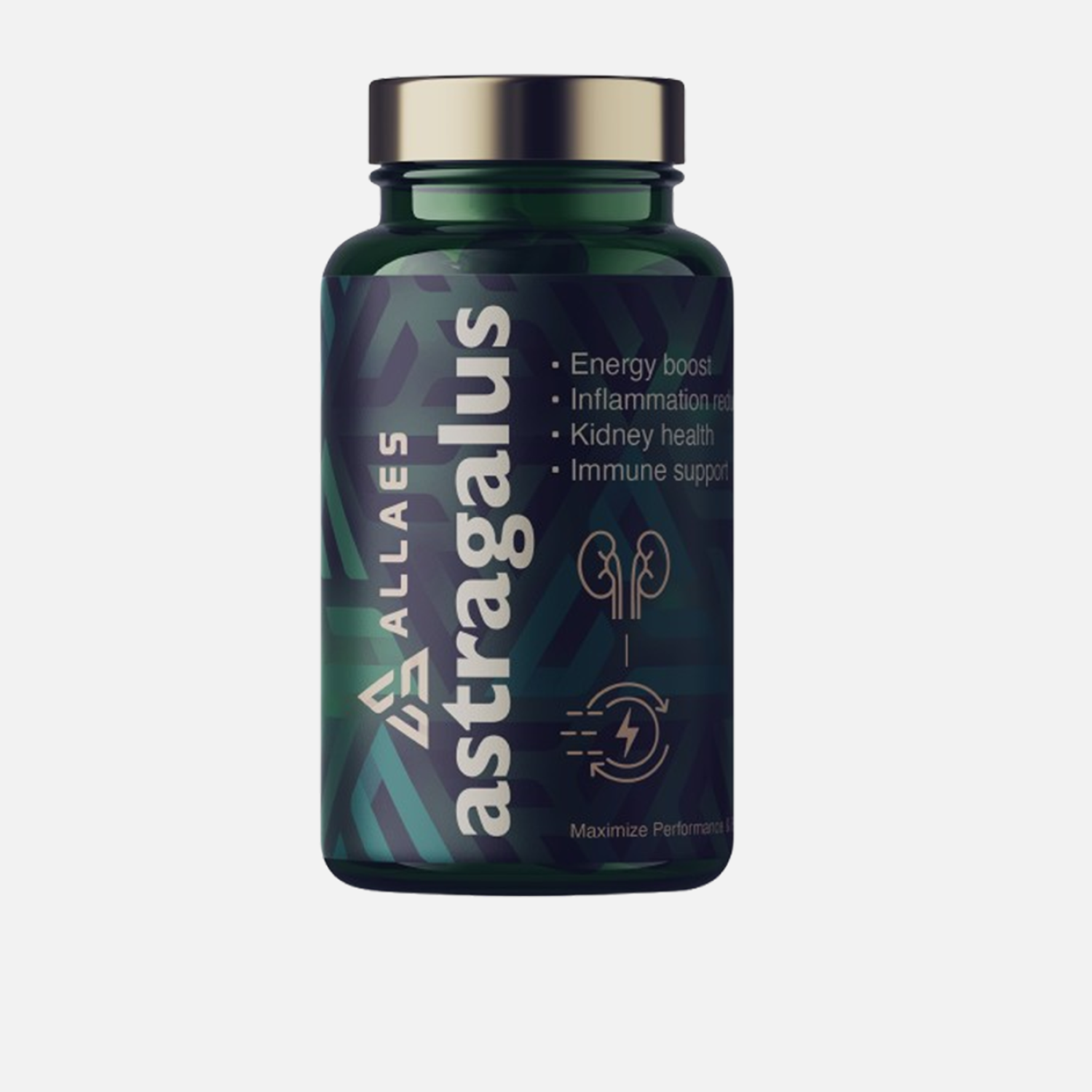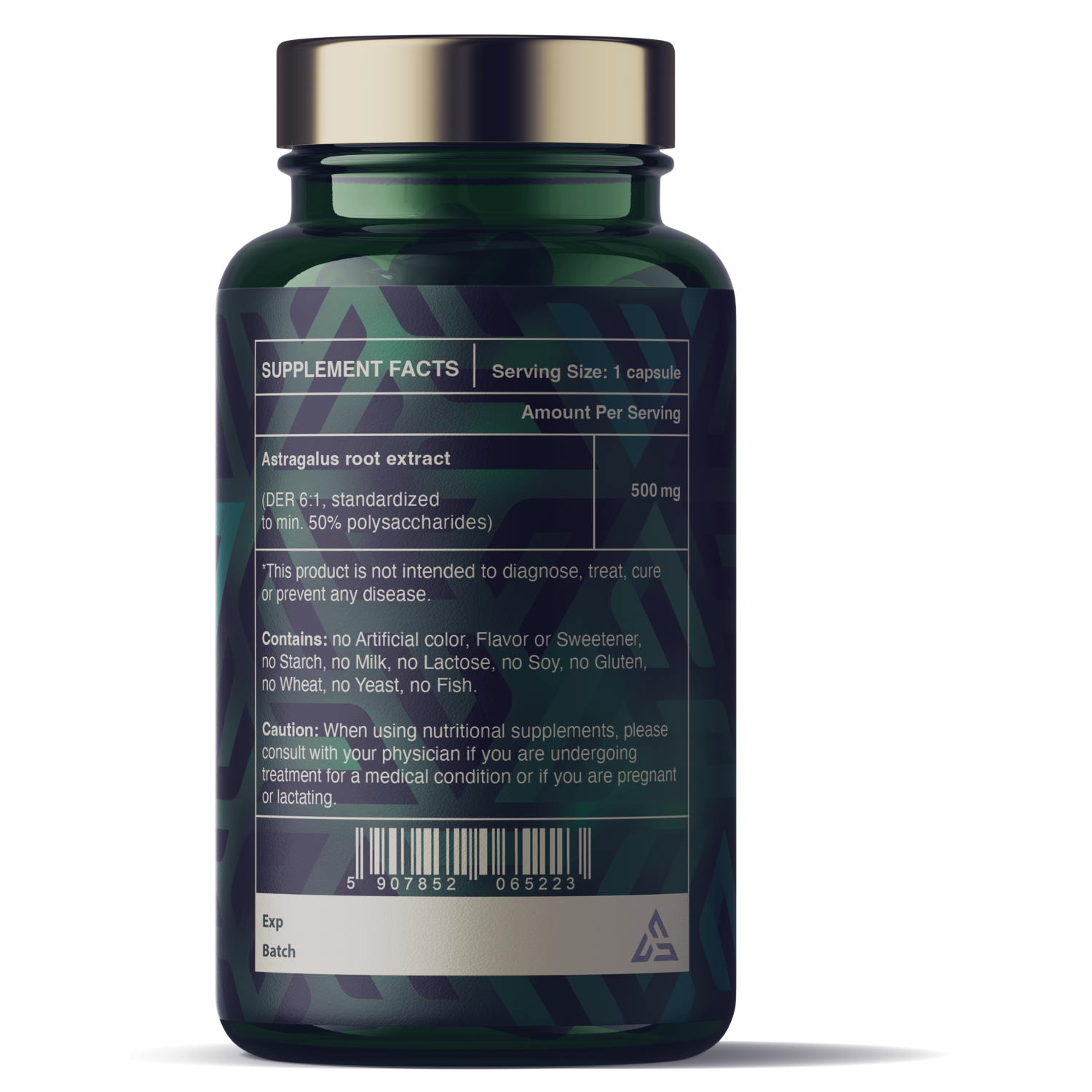



- Stock: In Stock
Astragalus membranaceus — adaptogen, immune support, and internal defense
Astragalus (Astragalus membranaceus) is a plant whose root, also known as Huang Qi, has been used for centuries in traditional Chinese medicine to restore vital energy, support recovery after illness, and protect the body during periods of physical or emotional exhaustion. Modern research continues to confirm its wide range of benefits.
Astragalus helps strengthen the immune system and balance inflammatory processes, reducing the overall burden on the body during stress or illness. It enhances the function of mitochondria — the energy powerhouses of cells — supports recovery from fatigue, improves kidney filtration and circulation. Studies also point to its antidiabetic potential: Astragalus may improve insulin sensitivity and help lower blood sugar levels. Thanks to its ability to inhibit abnormal cell growth and activate immune defense mechanisms, it also shows promising anticancer properties. Additionally, it may slow cellular aging and support male fertility.
Who can benefit from Astragalus?
✔ If you get sick often or feel your immune system is weakened — Astragalus naturally activates the body’s defense mechanisms, increasing resistance to infections and supporting faster recovery.
✔ If you experience chronic fatigue, tire easily, or recover slowly after physical or mental exertion — the active polysaccharides and antioxidants in Astragalus support mitochondrial function, improve energy metabolism, and reduce low-grade inflammation often present during exhaustion.
✔ If you take medications, train at high intensity, or follow a high-protein diet — Astragalus may help reduce kidney strain, support filtration function, and lower protein levels in urine — an early marker of kidney overload.
✔ If you live under chronic stress — Astragalus helps balance immune response by reducing pro-inflammatory cytokines like IL-6 and TNF-α, which often remain elevated during stress and impair recovery.
✔ If you monitor your blood sugar, are prone to metabolic issues, or carry excess weight — Astragalus may enhance insulin sensitivity, help stabilize blood glucose levels, and reduce inflammation linked to visceral fat accumulation.
✔ If you want to support cardiovascular health — Astragalus improves microcirculation, protects blood vessels from inflammation, and helps maintain capillary elasticity.
✔ If you’re looking to protect your body from age-related or pathological changes — Astragalus may slow cellular aging by activating telomerase and protecting DNA, while also promoting the detection and suppression of atypical cells, reducing cancer-related risks.
How to take Astragalus correctly
- Recommended dosage: 1–2 capsules per day. This range effectively supports immunity, energy levels, and overall recovery. It’s best to start with 1 capsule daily and increase the dose if needed.
- Maximum dosage: Up to 4 capsules per day (2000 mg of extract). These doses have been used in clinical studies and were well tolerated by most participants. However, since the long-term effects of high doses are not fully understood, it’s recommended to increase gradually while monitoring your well-being.
- Best time to take: Anytime during the day. Ideally, take it in the morning or early afternoon, as some users report difficulty falling asleep when taking Astragalus late in the evening. If you have a sensitive stomach, take it with food.
- How long to take: At least 4 weeks. A stable effect is usually achieved within 2–3 months of consistent use. Studies have shown that even up to one year of use does not cause adverse effects. The benefits are cumulative, so initial improvements are typically noticeable within 1–2 weeks of regular intake.
How does Astragalus work?
The active compounds in Astragalus — primarily polysaccharides and saponins (such as astragalosides) — trigger a cascade of protective mechanisms in the body. Polysaccharides directly activate key elements of the immune system: they enhance the activity of macrophages (cells that first detect and engulf viruses and bacteria), stimulate T-cells (which coordinate immune responses and detect infected cells), and increase the activity of natural killer (NK) cells, which eliminate mutated or virus-infected cells. As a result, the body responds to infections more effectively and recovers faster from illness or physical stress.
Interestingly, this immune-stimulating mechanism is also responsible for Astragalus’s anticancer potential. Studies in animal and cellular models have shown that Astragalus can slow the growth of tumor cells by enhancing immune surveillance and suppressing inflammatory signaling pathways involved in tumor progression.
Saponins, particularly astragalosides, play a key role in modulating inflammation. They reduce levels of pro-inflammatory cytokines such as IL-6 and TNF-α, which are often elevated during chronic stress, overtraining, or illness. By reducing systemic inflammation, Astragalus helps the body recover more efficiently, improves overall well-being, and slows tissue aging.
Astragalus also supports cellular energy production by protecting mitochondria — the organelles responsible for generating ATP. Under conditions of inflammation and oxidative stress, mitochondrial function is impaired. The active compounds in Astragalus stabilize mitochondrial membranes, lower levels of free radicals, and help maintain efficient energy metabolism. This is crucial for the brain, muscles, and immune system, especially during periods of intense physical or mental demand.
Its kidney-protective effects come from reducing capillary permeability and supporting filtration processes. Astragalus has been shown to lower protein levels in urine — an early indicator of kidney strain, particularly relevant during high-protein diets, intense training, or pharmacological use.
Astragalus also influences the enzyme telomerase, which helps slow cellular aging by maintaining telomere length — the protective caps at the ends of chromosomes. By activating telomerase, Astragalus helps cells retain their regenerative capacity and resist age-related decline.
Finally, Astragalus has a beneficial effect on glucose metabolism. Its active compounds improve insulin sensitivity, help regulate blood sugar levels, and reduce inflammation — particularly important in cases of excess weight and visceral fat accumulation, where chronic low-grade inflammation impairs recovery and increases the risk of metabolic disorders. This effect may help reduce the risks associated with obesity, insulin resistance, and type 2 diabetes.
What problems does Astragalus help solve
Strengthens the immune system and reduces inflammation
Astragalus supports immune function and helps balance inflammatory responses. Its active components, such as polysaccharides and saponins, enhance the activity of T-lymphocytes and natural killer cells, which detect and destroy infected or abnormal cells. Additionally, Astragalus extract reduces levels of pro-inflammatory cytokines like IL-6 and TNF-α, which often remain elevated during chronic stress or metabolic disorders, hindering recovery and accelerating aging.
Study: Supplementation with Astragalus led to a decrease in inflammatory cytokine levels and improved immune regulation in patients with type 2 diabetes.
Improves energy metabolism and reduces chronic fatigue
Astragalus helps restore cellular energy by supporting mitochondrial health — the organelles where most cellular energy is produced. Polysaccharides from Astragalus protect mitochondria from oxidative stress and maintain their function under fatigue or illness.
Study: Several weeks of Astragalus intake significantly reduced chronic fatigue levels in patients compared to the control group.
Supports cardiovascular health
Astragalus improves microcirculation, protects blood vessel walls from inflammation, and helps maintain vascular elasticity. These effects are especially important under stress, high blood pressure, and metabolic disorders.
Study: Use of TA-65 (a compound based on Astragalus) for 12 months improved cardiovascular markers, including reductions in blood pressure and cholesterol levels.
Has antidiabetic effects
Astragalus compounds (particularly polysaccharides and flavonoids) enhance tissue sensitivity to insulin, improve pancreatic beta-cell function, and lower blood glucose levels. This makes it a promising supplement for supporting metabolic health and preventing diabetes-related complications.
Study: A plant-based complex with Astragalus improved blood glucose, beta-cell function, and antioxidant enzyme activity in patients with type 2 diabetes.
Promotes cellular longevity
Astragalus can activate telomerase — the enzyme that protects telomeres (the ends of chromosomes), which shorten with age. Maintaining telomere length is associated with better regenerative capacity and slower biological aging.
Study: TA-65 (based on Astragalus compounds) increased telomere length in older adults after one year of use.
Enhances male fertility
Stress, inflammation, and fatigue can impair sperm motility. Astragalus has been shown to improve sperm viability and motility, making it a potentially useful supplement in cases of male infertility.
Study: In vitro, Astragalus increased sperm motility by more than 45%.
Reduces the risk of tumors and cancer
Astragalosides and other active constituents of Astragalus modulate immune function and regulate cell growth, helping the body combat tumor cells. Extracts have been shown to enhance macrophage activity and increase the production of antitumor cytokines.
Review: Astragalus extract and its saponins regulated key signaling pathways in gastrointestinal cancers, demonstrating antitumor activity.
Benefits for PEDs users
When you’re using hormonal agents, stimulants, or any substances that put strain on your metabolism, the body operates under pressure. The kidneys filter waste more intensively, immune function becomes suppressed, and inflammation and fatigue increase — even with proper nutrition. In these conditions, Astragalus can offer real support.
First, it helps regulate inflammation. Even if it’s not immediately noticeable, the use of AAS or stimulants is almost always associated with elevated levels of pro-inflammatory cytokines. These molecules impair recovery, hinder tissue regeneration, and disrupt immune balance. The active compounds in Astragalus help modulate this process, reducing systemic inflammation — which is especially important during PCT or when dealing with chronic fatigue.
Second, Astragalus acts as kidney support. High-protein diets, intense training loads, or compounds that increase metabolic stress can overload renal function. This often shows up in lab work as elevated urea or protein in urine. Astragalus may help reduce these markers and preserve filtration capacity — particularly important during bulking or recovery after a heavy cycle.
Additionally, it supports energy and endurance. Astragalus has been shown to reduce feelings of chronic fatigue, improve work capacity, and shorten recovery time. In fact, studies show that taking 500 mg of extract twice daily significantly reduced symptoms of long-term fatigue, including cognitive burnout and general lethargy — effects many athletes experience during PCT or cutting phases.


